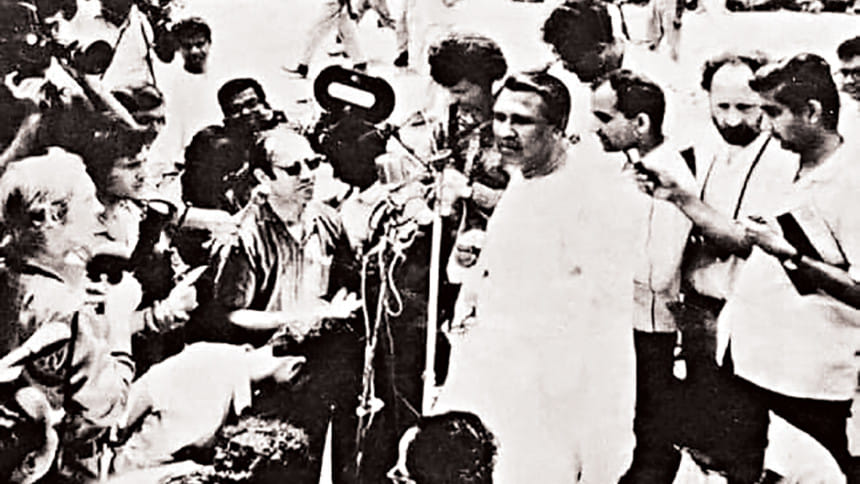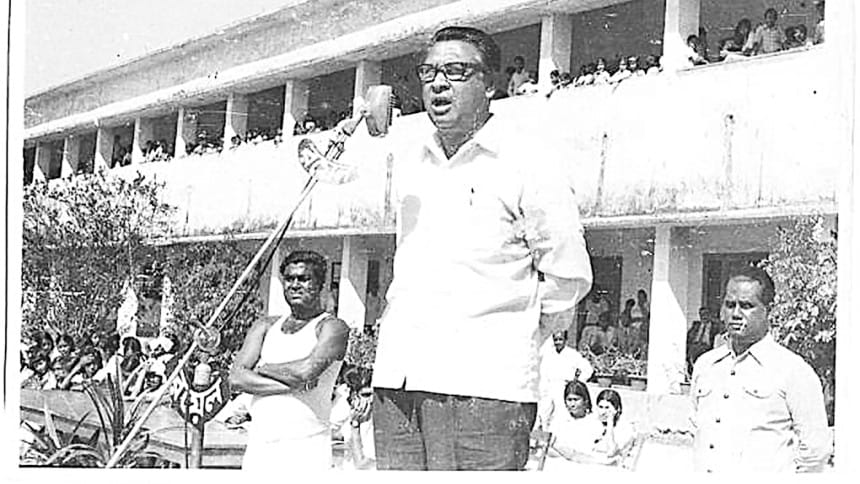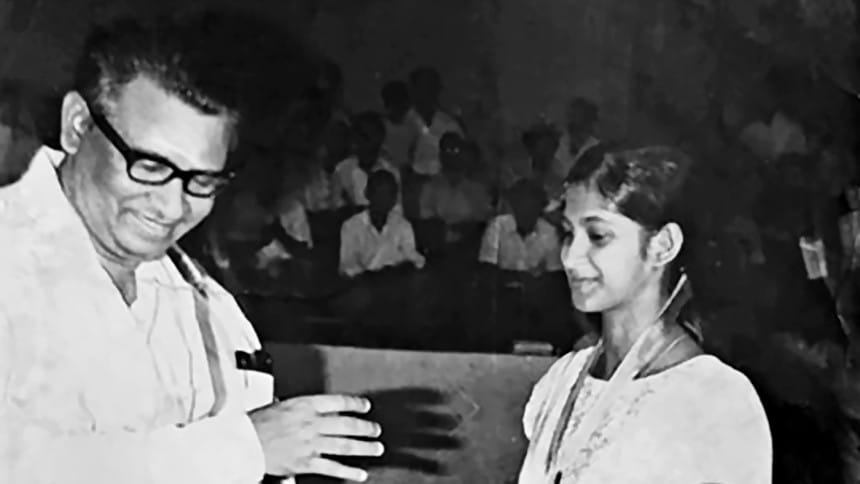Our moral inheritance Tajuddin Ahmad’s call to national conscience

If we but listen closely, we may yet hear the resounding footsteps of Tajuddin Ahmad echoing from the hallowed halls of heroes past. Interwoven within the fabric of the starry constellations above our blessed motherland, and embedded within the very soil upon which we tread, are Tajuddin Ahmad's pulsating heart, his resonating soul, and his unshakeable legacy. This July marks the centennial of the pioneer of the first-ever Bengali nation in history—our nation's first Prime Minister and founder of Bangladesh's wartime government-in-exile, who, against all odds, through the strength of the people's will and his own tenacity, foresight, and character, successfully shepherded Bangladesh through the Liberation War of 1971 to achieve independence and nationhood.
Since his foundational wartime stewardship, we have, as a nation, tragically borne witness to over half a century of alternating governance breeding cultures of cynical, zero-sum hyper-partisanship and violent factionalism—all characterised by the misuse of public institutions and abuses of public trust, culminating last year in the most heinous mass slaughter and savagery since independence by the powerful few over the voiceless many. We continue now, wading through the fallout of unbridled degeneracy in the forms of rape, looting, armed intimidation, and political killings.
Where is the humanity?
A collective conscience in crisis has proven as great an affliction for the nation as any pandemic or plague. In the midst of our struggle to find our bearings as a people—caught between justified anger at recent betrayals and the dangerous temptation to abandon our foundational truths altogether—we commemorate the centennial of one of the most consequential and conscientious statesmen of the 20th century. What inspiration can we draw from Tajuddin's life, legacy, and heart in helping heal Bangladesh?
The cynics would have us believe that moral bankruptcy was always our destiny, that the seeds of corruption were sown from independence itself. Yet Tajuddin's example stands as a living refutation of such historical nihilism. Here was a leader whose private virtue and public service formed an unbroken whole, whose very existence proves that principled governance was not only possible but achieved—however briefly—at our founding moment.
I recall much of my formative youth in the United States spent sharing a home with struggling guests and families. Sharmin Ahmad "Reepi," my mother and Tajuddin's eldest daughter, once hosted a family of six whose two-month stay turned into several years until the guests could get back on their feet. During her own childhood, my mother would frequently wake to find mothers with their children from myriad villages sharing her room and bed. Her father would use the home as a waystation for those in need of treatment or other help. My Nanu, the late Zohra Tajuddin "Lily," continued this tradition and would often tell me that my Nana, Tajuddin, was not only her husband but also her greatest mentor. Their very union had been consecrated in the same spirit of principled simplicity—wedding jewellery fashioned of jasmine flowers, their symbolic rings mere strings—in beautiful defiance of materialistic extravagance. Tajuddin's indelible impact remained alive in both the dignified poise and presence of his wife, and remains apparent in the altruistic idealism of his daughter.

In Tajuddin's conception of leadership, privileges were not meant to be acquisitively coveted or exploited. They were meant to be directed towards public welfare and those most in need. So transcendent was his integrity that when a government employee who had once refused his fleeing wife shelter during the military crackdown came up for promotion, Tajuddin advanced the man based solely on merit, placing principle above personal grievance. In fact, in the current era—where one can be hard-pressed to find the virtues extolled by public figures reflected in their private lives—Tajuddin, by contrast, was remarkably congruent. Loath to vain practices, diary entries going back to the era of British India demonstrate him eschewing even simple birthday celebrations for day-long public service and meetings.
Having a heart purged of ego attuned him to the needs of others. His life of service is often described as one of "self-sacrifice." Undoubtedly, when he—after a life of civil disobedience campaigns and years in prison—held himself to an oath to return to family life only on condition of successfully liberating Bangladesh, and set off with his revolutionary protégé, Barrister Amirul Islam, to risk life and limb to do so, "self-sacrifice" seems an apt description. However, I believe that, to Tajuddin, it went beyond that.
Service must necessarily have been sacred to him. You see, "sacrifice" implies becoming diminished in some sense. I do not believe Tajuddin could have channelled the will of the people of nascent Bangladesh to overcome seemingly insurmountable obstacles in the way he did without deriving immense purpose—and, dare I say, spiritual fulfilment—from what he did. His service was simply his way of life; his service reflected his heart.
Examining his more private moments, how many in their adolescence would otherwise choose to spend their leisure time picking the brains of four imprisoned anti-colonialist revolutionaries in pursuit of actionable intellectual edification—and then go on to finish reading their large stack of recommended books? How many children would trade idle play or gossip to tend to the needs of outcast cholera victims, and enlist their mother's support in cooking to feed them? During the devastating famine of 1943, an adolescent Tajuddin devised and implemented the "Dharmagola" system—collecting food from the rich during harvests and storing it for the hungry in case of future disasters. Renowned among his peers as a peacemaker, young Tajuddin would even stand up for the wronged at the risk of his own status or well-being. His acutely sensitive heart remained his defining feature into adulthood. My mother often recalls how she spied on him from a distance, silently weeping over a bird that died during a terrible storm.

On another occasion, when he was found uncharacteristically missing from his Mujibnagar office, Prime Minister Tajuddin was traced to the quarters of his office staff, where he was tending to the man's fever with a wet towel in hand. Even while embroiled in a geopolitical nightmare—the feeding and sheltering of 10 million Bengali refugees, the arming and training of freedom fighters, fending off assassination attempts and subversive plots all the while—he was not beyond the moment and the simple calls of humanity.
Tajuddin's understated nature with those in subordinate positions belied the steely, forthright resolve with which he would confront those in power. This reputation preceded him in such a way that Zulfikar Ali Bhutto, fearing Tajuddin's prowess, declined to participate in a public debate with him over the Awami League's Six-Point Programme of 1966. Author and veteran diplomat S.A. Karim favourably compared Tajuddin's adeptness at organising the Awami League's civil disobedience campaigns with that of Mahatma Gandhi. The golden era of Bengali politics truly reminds us how unapologetically altruistic that generation was. Power was not coveted for its pretentious trappings.
Even while accepting India's crucial aid during the war, Tajuddin maintained Bangladesh's sovereignty with remarkable diplomatic finesse—securing India's commitment to withdraw troops upon Bangladesh's request (an exceedingly rare occurrence of a greater military power honouring such wishes in the 20th century) and ensuring his government operated on taxes collected from liberated Bangladeshi territories rather than foreign funding. This principled independence would define his approach to all foreign relations: years later, facing World Bank President Robert McNamara's conditional lending offers for a war-torn Bangladesh, Tajuddin's unwillingness to eagerly thaw tensions to chase quick loans earned him recognition at the time as "the best finance minister in the world."
This principled courage extended even to allies: when the larger-than-life Bangabandhu Sheikh Mujibur Rahman—seemingly in lockstep with Tajuddin until 1971—chose to stay at home, even in the face of the impending military crackdown and slaughter, Tajuddin resolved to forge ahead alone to carve out the path toward freedom. Years later, facing mounting cronyism and abuse of power, he would again choose principle over position, quietly resigning from the cabinet in disagreement over the direction the country was heading.
Tajuddin's star ultimately shone the brightest during the darkest, bloodiest days, where he had to reassemble and reorganise the scattered leadership while navigating a geopolitical labyrinth. Achieving victory would not confer upon him any of the glory, but defeat would certainly spell doom for him and the fledgling nation. Among his most able compatriots, Amirul Islam helped defend the integrity of Tajuddin's government from would-be detractors among the young guard, and Muyeedul Hasan helped orchestrate the Soviet-Indian pact as a signal to potential aggressor nations. His leadership was further exemplified by his rare capacity to amass and earn the respect of individuals of the highest intellectual calibre—eminent economists Rehman Sobhan and Nurul Islam, renowned scholar-professor Anisuzzaman—into the councils and advisory bodies that guided the nation's cause.
Tajuddin's stewardship helped secure Bangladesh's liberation in nine months, prevented further genocide, and helped free Bangabandhu Sheikh Mujibur Rahman from Pakistan's captivity. In the war's aftermath, Tajuddin envisioned a grand path forward for his people, their vigour and hopes still high, fresh off the battlefields. His national initiative was supported by respected figures like Mowlana Bhashani in an inclusive all-party National Advisory Committee to channel the liberated masses into rebuilding the nation, while the government provided for upkeep, education, and training. This vision sought to bring within reach of the common individual the very resources and stakes of nationhood, ensuring that the farmers, students, and labourers who had bled for freedom would help build what they had died to create.
Tragically, however, the hostile elements opposed to this inclusive vision—the very elements who had opposed, betrayed, and lethally attacked Tajuddin and Bangladesh's nascent government throughout the Liberation War—would manoeuvre their way back into the centres of power. This fundamental shift away from Tajuddin's founding ideals—from empowering the masses to concentrating power among the unchecked few—would begin the cycle of partisan divisions, institutional capture, and abuses of authority that have characterised the alternating governments in the decades since. Even after Tajuddin had relinquished leadership following his successful liberation of both Bangladesh and Sheikh Mujib, even after his principled resignation from the cabinet in 1974, those who viewed his very existence as an intolerable reminder of what governance could be would not be satisfied. His brutal assassination while imprisoned without charge on 3 November 1975 revealed the depths to which power-seekers would sink when confronted with the moral authority of someone who had proven that principled leadership was achievable. In nine months of wartime stewardship, he had shown a nascent nation—and the world—the heights that dedicated service could reach.
We must not allow the betrayal of his vision to eclipse the vision itself. Tajuddin's legacy is not diminished by what came after; it is made more precious, more necessary. In our current moment of national reckoning, when we are tempted to burn down the house to rid it of what may fester, we must distinguish between the architecture of liberation and the rot that later set in. To abandon Tajuddin's principles because they were later corrupted is to complete the work of those who corrupted them.
At the outset, Tajuddin had declared the fight for Bangladesh's freedom to be the province of the students, the farmers, and the labourers. The common individual had a stake in their own country and future. He implored the freedom fighters, "Let us work in such a way so that we cannot be found in the pages of history." How prescient! We must, however, rediscover our heroes for our own sake. When we choose to forget the best among us, we choose to forget the best within us. We are all Tajuddin. My grandmother understood this when, upon hearing of her husband's assassination, she recognised that however tragic her personal loss, losing Tajuddin was a far greater loss for the country.
His centennial calls us not merely to remember but to reclaim—to resurrect the moral clarity that once made liberation possible, to revive the sacred conception of service that once made governance noble. In an age of cynicism, his life stands as proof that idealism can be practical, that principle can be powerful, that service can be sacred. The question is not whether we are worthy of his legacy, but whether we are brave enough to live it.
A people without a history cannot claim an identity. And a people without an identity cannot claim a future.
Taj Iman Ahmad Ibn Munir is the grandson of Tajuddin Ahmad and founder of Jaagoron: a transformative movement for peace and unity. He is also the host of Quest and Conquest Podcast.

 For all latest news, follow The Daily Star's Google News channel.
For all latest news, follow The Daily Star's Google News channel. 



Comments